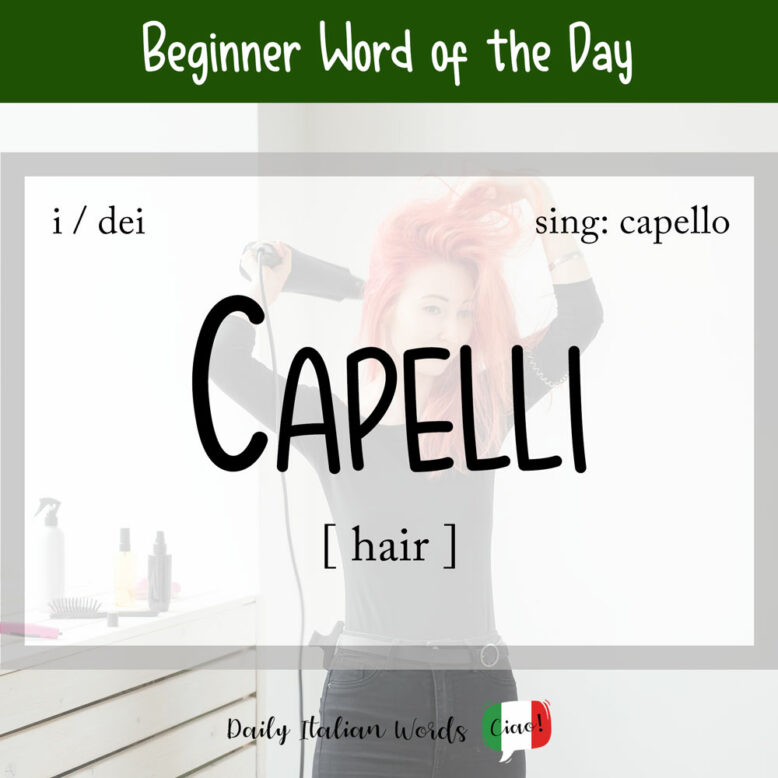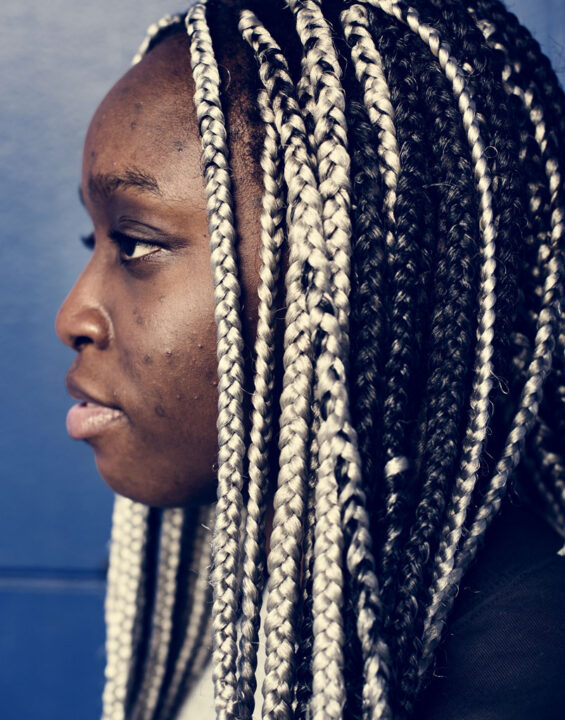The word for the hair on one’s head is the plural capelli in Italian. The singular capello, on the other hand, usually refers to an individual strand of hair.

This word is easily mixed up with the similar sounding cappelli, the plural of cappello, which is the Italian word for hat. You can hear the difference by carefully listening to the phrase below. (Pay attention to the brief pause that occurs between the two Ps in cappello!)
I cappelli tendono ad appiattire i capelli.
Hats tend to flatten hair.
Below is a list of the most common types and styles of hair (tipi e tagli di capelli) and hair colours (colori dei capelli).
Tipi e tagli di capelli
Hair types and styles
- capelli lunghi = long hair
- capelli corti = short hair
- capelli lisci = straight hair
- capelli mossi / ondulati = wavy hair
- capelli ricci = curly hair
- capelli fini = fine hair
- capelli crespi = frizzy hair
- capelli piatti = flat hair
- capelli rasati = shaved hair
- capelli disordinati = messy hair
- capelli annodati = tangled hair
- capelli unti = greasy hair
- capelli radi = thinning hair
Colori dei capelli
Hair colour
- capelli chiari = fair hair
- capelli scuri = dark hair
- capelli biondi = blonde hair
- capelli castani = brown hair
- capelli neri = black hair
- capelli rossi = red hair
- capelli bianchi = white hair
- capelli grigi = grey hair

To say to do your hair in Italian, you can choose between the reflexive verbs farsi / acconciarsi i capelli (to style one’s hair) or sistemarsi i capelli (to tidy one’s hair).
Prima di uscire, mia sorella vuole sistemarsi i capelli.
Before going out, my sister wants to do her hair.
When you go to the hair salon (parrucchiere) or barber shop (barbiere) to get a new haircut (nuovo taglio di capelli / nuova acconciatura), there are various kinds of equipment and products the hairdresser will use on your hair. These include a hairbrush (spazzola), hair clippers (tagliacapelli), a hairdryer (fon or asciugacapelli), hair dye (tinta per capelli), a hair straightener (piastra per capelli), hair clips (fermacapelli), curlers (bigodini) and a razor (rasoio).

Here is a selection of useful verbs you’ll often see used with capelli in conversation:
- pettinarsi i capelli = to comb/brush one’s hair
- farsi tagliare i capelli = to get one’s hair cut
- lasciare crescere i capelli = to let one’s hair grow
- perdere i capelli = to lose one’s hair
- asciugarsi i capelli = to dry one’s hair
- raccogliere i capelli = to put up one’s hair
- sciogliersi i capelli = to let down one’s hair
- portare i capelli (corti/lunghi/etc.) = to wear one’s hair (short/long/etc.)
Ponytail translates literally as coda di cavallo (tail of the horse) in Italian, though usually it is shortened to simply coda (tail), whereas pigtails are referred to as codini (little tails).
As for a head of hair, it translates as either chioma or capigliatura.

Useful expressions with the words “capello / capelli”
There are many expressions with the word capello and its plural capelli. Here is a list of the most interesting ones.
Avere un diavolo per capello
Literal translation: to have a devil on each hair
English meaning: to be furious, irritable
Averne fin sopra i capelli
Literal translation: to have it over your hair
English meaning: to be sick or tired of something / someone
Tirato per i capelli
Literal translation: pulled by the hair
English meaning: far-fetched, stretching things a bit
Mettersi le mani nei capelli
Literal translation: to put one’s hands in one’s hair
English meaning: to tear one’s hair out
Essere sospeso a un capello
Literal translation: to hang by a hair
English meaning: to hang by a hair
Non spostarsi di un capello
Literal translation: to not move by a hair
English meaning: to not budge an inch
Spaccare un capello in quattro
Literal translation: to split a hair into four
English meaning: to split hairs
Avere più guai che capelli
Literal translation: to have more troubles than hair
English meaning: to have a huge number of problems to deal with
Far venire i capelli bianchi
Literal translation: to make one’s hair white
English meaning: to worry somebody a lot (so much that his/her hair becomes white)
Heather Broster is a graduate with honours in linguistics from the University of Western Ontario. She is an aspiring polyglot, proficient in English and Italian, as well as Japanese, Welsh, and French to varying degrees of fluency. Originally from Toronto, Heather has resided in various countries, notably Italy for a period of six years. Her primary focus lies in the fields of language acquisition, education, and bilingual instruction.


